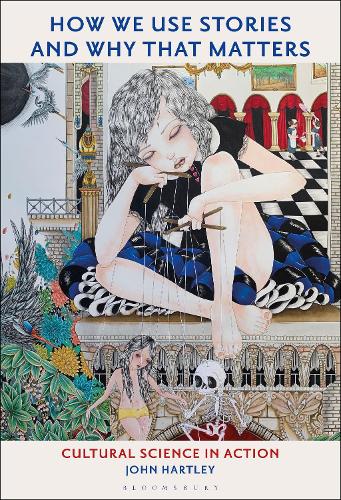
How We Use Stories and Why That Matters: Cultural Science in Action
(Paperback)
Publishing Details
How We Use Stories and Why That Matters: Cultural Science in Action
By (Author) Prof. John Hartley
Bloomsbury Publishing PLC
Bloomsbury Academic USA
29th July 2021
United States
Classifications
Tertiary Education
Non Fiction
Cultural studies
Media, entertainment, information and communication industries
306.01
Physical Properties
Paperback
312
Width 152mm, Height 229mm
422g
Description
Using compelling examples and analysis, this open access book How We Use Stories and Why That Matters shows what the New York Shakespeare Riots tell us about class struggle, what Death Cab for Cutie tells us about media, what Kate Mosss wedding dress tells us about authorship, and how Westworld and Humans imagine very different futures for Artificial Intelligence: one based on slavery, the other on class. Together, these knowledge stories tell us about how intimate human communication is organised and used to stage organised conflict, to test the fighting fitness of contending groups provoking new stories, identities and classes along the way. This book guides the reader through the tangled undergrowth of communication and cultural expression towards a new understanding of the role of group-mediating stories at global and digital scale. It argues that media and networked systems perform and bind group identities, creating bordered fictions within which economic and political activities are made meaningful. Now that computational and global scale, big data, metadata and algorithms rule the roost even in culture, subjectivity and meaning, we need population-scale frameworks to understand individual, micro-scale sense-making practices. To achieve that, we need evolutionary and systems approaches to understand cultural performance and dynamics. The opposing universes of fact (science, knowledge, education) and fiction (entertainment, story and imagination) so long separated into the contrasting disciplines of natural sciences and the humanities can now be understood as part of one turbulent sphere of knowledge-production and innovation. The ebook editions of this book are available open access under a CC BY-NC-ND 4.0 licence on bloomsburycollection.com. Open access was funded by Knowledge Unlatched.
Reviews
As always, original, incisive and quite simply brilliant: Hartley causes us to rethink our foundational assumptions about what culture is and what it is for. * Catharine Lumby, Professor of Media, Music, Communication and Cultural Studies, Macquarie University, Australia *
In the era of fact wars and post truth, the ability to tell, listen to, and interpret stories is our cultural backbone. It paves the road to personal balance. Hartley demonstrates, yet again, that meaning lies everywhere and it is up to us to document it, through storytelling. An outstanding and original contribution. * Zizi Papacharissi, Professor and Head of Communication and Professor of Political Science, University of Illinois at Chicago, USA *
Author Bio
John Hartley has worked in senior positions in Australia at Curtin University, as John Curtin Distinguished Professor and Professor of Cultural Science, and at Queensland University of Technology, as Australian Federation Fellow and dean of Creative Industries. Previously he was first head of the Journalism School at Cardiff University in Wales, UK. He has held visiting scholar positions in the USA, UK, China, Germany and Denmark, and served on ministerial advisory bodies in Australia, China, Thailand and Indonesia. He was awarded the Order of Australia for service to education, and holds elected fellowships of the Australian Academy of the Humanities, Learned Society of Wales, and International Communication Association. He has published more than 30 books in communication, cultural and media studies, including Cultural Science (with Jason Potts, 2014), Creative Economy and Culture (with Wen Wen and Henry Li, 2015), and How We Use Stories and Why That Matters (2020).
